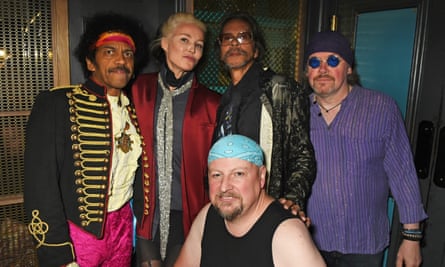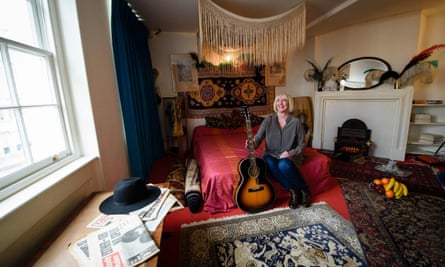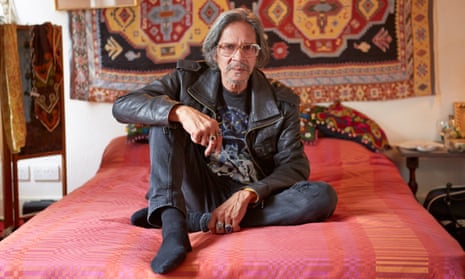The eyes have it: immediately, and strikingly, the same as those staring out from the portrait of Jimi Hendrix on the wall. But of course, this is Leon Hendrix, the younger brother of the greatest guitarist of all time, and in London this weekend, 50 years since Jimi arrived in Britain in 1966 to launch his astonishing career.
Leon Hendrix bounded up the stairs of the house in Brook Street, London W1 – which George Frideric Handel had also occupied two centuries earlier – to the top flat in which Jimi lived in 1968 and 69. It is now beautifully decked out to look exactly as it was, a museum and music centre called Handel & Hendrix in London, where Hendrix’s Little Wing is played on the harpsichord in Handel’s music room.
Later on Saturday evening, Leon – born six years after Jimi – picked up his own guitar to play his brother’s, and his own, music at the Scotch of St James, the London club where Jimi had played.

Leon is slender, intense, and enjoys the inevitable conversation about his brother rather than himself, in the room which Jimi called “the first real home of my own”.
Everyone knows the Hendrix childhood was hardly that of a model family – a mother who left, and a father who drank more than he cared. “But Jimi looked after me,” recalls Leon. “For some reason, I never missed a meal. He looked out for me like an elder-brother-father; he made me what you English call ‘tea’ and made sure I was OK. And sometimes, we used to sneak off to Mom’s for dinner.”
But where did the music come from? “It’s called inspiration,” says Leon, almost scolding. “As in ‘spirit’, as in ‘in-spirit-ation’. It’s in the wind. I was there when Jimi was a boy, and he’d play with a broom, his first guitar. And Pa would come home and see the straw and shit from the broom on the floor, because Jimi’d been doing acrobatics with his his broom-guitar, and Jimi’d get a whuppin’.”
According to Leon’s book, Jimi Hendrix: A Brother’s Story, Jimi’s first real instrument was a ukulele the boys found while cleaning out a neighbour’s garage. When he finally got a guitar, Jimi, says Leon, “used to take gold tassels from his Pa’s empty Seagrams 7 bottles and tie them to it.
“But the music came from nowhere,” he says. “Music has no body, and I remember when Jimi was playing, he’d try to conjure up the sound with his fingers – where is it?” Once, “when we were little, Jimi took a radio apart, trying to find the music inside it. We lost the screwdriver behind the sofa and couldn’t put it back together, and that was another whuppin’.”

Leon says, poignantly, of Hendrix’s soft vocal timbre: “It came from always being told to shut up as a kid. Jimi went inside with his music, and when he got on stage, that was his time”.
There is genetic lineage, it turns out, as Leon imparts some new information “My mother’s grandfather was a musician. He was black, but looked so white he was allowed to play, down in Louisiana. He played orchestral music in the 1800s.” However, “my own children want nothing to do with music, they’ve seen what it did to us. My daughter’s in Mexico and my son wants to be a scientist, or a doctor. But I’ve got these grandchildren – and they’re mighty interested. ‘Hey, grandpa, play us that music by uncle Jimi!’
“But in one way”, reflects Leon, “Jimi’s just my brother. When I was little, I thought what he was doing was ordinary stuff. I didn’t even know we were poor, it was just life in the projects.” He remembers Jimi taking him to see Buster Crabbe in 15-minute Flash Gordon films, for a nickel – “that was Jimi’s nickname: ‘Buster’”.
Leon has had an interesting life: taken into care at a foster home – where Jimi would visit him – short periods in jail for minor offences, drug problems for which he was successfully treated, and being taken on tour with his brother, during which he got “a share in the chicks backstage”.
An accomplished artist, Leon went on to work with the Boeing aerospace company as an expert technical draughtsman. “I thought I was going to be drawing airplanes like Jimi taught me”, he says, “but it was nothing like that. You draw this bolt, or this nut and off it goes to some department and into a bit of machinery. So I quit.”
Leon was left out of his father Al’s will when he died in 2002, the estate going to Al’s adopted daughter in another marriage, Janie. Leon has initiated serial court cases staking a claim to his brother’s music, as far as the US Supreme Court, which upheld the will. However, another ruling in 2011 granted Leon “rights to his brother’s name and likeness” – though not his music – and there was an undisclosed settlement in 2015. Although the overall loser in this bitter and often sordid battle, Leon says, in his brother’s old flat: “It’s their problem. They’ve made their billions, but I’m happy. I am my brothers brother. So who’s the richest?”
Leon launched his musical career “after the age of 50”, he explains, “and it got going after I separated from my Catholic-bird wife”. As the Leon Hendrix Band, he has released two albums, with another on the way, but for this special night at the Scotch, he joins other musicians from a band called Are You Experienced, whose lead guitarist, John Campbell from Birmingham, is not so much a cover or tribute artist as a devotee, says Leon, “whose antennae found my brother’s spirit”.
Hendrix, The Who, and others played the Scotch back in the day, and on Saturday night Handel & Hendrix in London booked the now upscale nightclub for a special early-evening commemorative shift. “Let’s play it for Jimi,” said Campbell in broad Brummie, wearing the trademark military parade jacket and an orange sash around his head, launching into Machine Gun and Star Spangled Banner as appropriated by Hendrix.

Leon introduced Bob Dylan’s All Along the Watchtower, saying: “Dylan picked up me and my Pa in his limousine, and called this one the song Jimi wrote!” Leon had some trouble remembering the lyrics, apologised, “Sorry Jimi” and confided to his audience: “I like to drink Jack Daniel’s.” So what, they said in the forgiving, happy crowd, it’s Jimi’s brother.
Leon had said back at his brother’s flat: “I just move with the spirit, man – where it takes me, I go, and Jimi’s there. He’s my brother and he’s still lookin’ out for me.” And now, at the end of the evening: “God bless you Jimi, for all the times you sent me round the world, following the spirit.”
Hendrix wrote his greatest ballad, Angel, for his mother, of whom he saw little. And of course, this was Leon’s mother too, of whom he saw even less. Which made for a cogent solo in Campbell’s rendering, during which Leon took his hands from his own rhythm guitar, removed his glasses and wiped a tear from his eye.

Comments (…)
Sign in or create your Guardian account to join the discussion